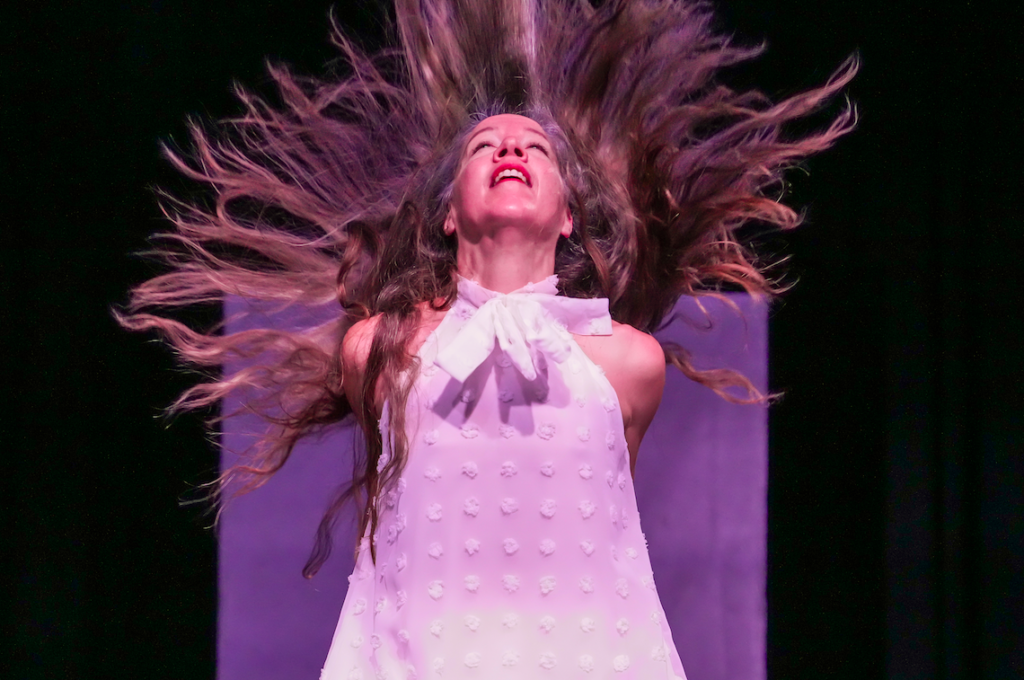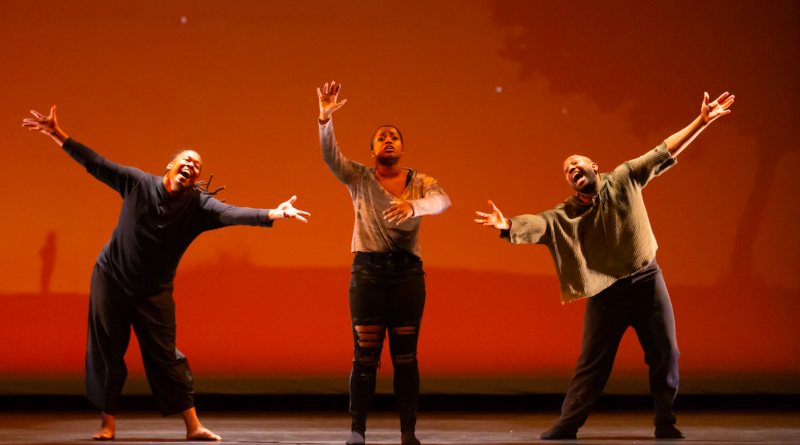INTERVIEW: Artists ban together for latest EstroGenius Fest
Photo: Darvejon Jones’ Sussurrations will be performed at EstroGenius Festival. Photo courtesy of the festival / Provided by Emily Owens PR with permission.
The EstroGenius Festival has returned to New York City with unique, multidisciplinary programming that centers on femme, trans, nonconforming, female and nonbinary artists. Events takes place in various venues around the city, including a Brooklyn community garden and the historic Kraine Theater, with performances running until April 2.
There are many different offerings at this year’s festival, which is co-presented by FRIGID New York and Manhattan Theatre Source. For example, this Friday, March 24, at UNDER St. Mark’s, audiences can engage with Audrey di Mola’s Grace Period, a solo show about a storyteller inspired by the myth of Ariadne to investigate the intergenerational trauma of her family. The 45-minute show is also available to stream. Another program is set for March 24-25 at the Kraine Theater. This one is called Core/Us and features the choreographic work of Vanessa Goodman; the piece will be paired with Resonant Body, a dance work centered on ocular-centricity from slowdanger.
At the center of the festival are co-producers and curators maura nguyễn donohue and Melissa Riker. They spearhead the programming, which this year falls under the banner of Ban(ned) Together, and focuses on a number of current events, including last year’s dismantling of Roe v. Wade. This activist showcasing of dance and theater has been going strong for more than 20 years, and the festival organizers believe these cultural events are needed now more than ever because of continued violence against femme and trans bodies, according to press notes.
Recently Hollywood Soapbox exchanged emails with Melissa Riker and maura nguyễn donohue about this year’s EstroGenius Festival. Questions and answers have been slightly edited for style.
Is producing the festival even more important in 2023 given everything that is going on in society and politics?
Melissa Riker: Ahh, I hate to say it, but yes. Since 2016, it has felt more pressing, more necessary and more vital. As long as there are politicians who need to control how a femme body exists in the world, question the need for nonbinary understanding or would deny the existence of trans bodies — it is needed! And that doesn’t even scratch the stubborn fact that femme artists still have to work so much harder for recognition.
EstroGenius was formed from a need for parity in hiring, and to create a generous and inclusive place to push playwrights to write better roles for women actors to play. Where we are now, 22 years later, is generally a more open society — language itself is finally cracking open in the mainstream — and what a women’s festival means has shifted. Still, the need for an inclusive space where artists can experiment or push their own work and be celebrated is very real.
maura nguyễn donohue: Thanks for a chance to get on the soapbox, right out of the gate! This is a dire time, a disgusting, hateful moment. But it’s been bad for many folx at many different times. It’s been downright genocidal. Current legislature has a direct impact on me and my kin, but so have previous laws. So, I would say the festival is always important because we always need to keep the heat on. To charge ourselves to stay in the fight, and for me, that is done in the community.
It is always urgent to seed change through intimate, locally-focused encounters. Large-scale change is built by persistent individuals committed to shared efforts. So, our interdisciplinarity and the shared programs that I curate reflect my desire to propose possible connections among artists.
How do you measure success for the EstroGenius Festival? Ticket sales? News coverage? An activist conversation that is generated?
maura nguyễn donohue: Viewership and news coverage do matter because it means folks are paying some attention to what happens. But, my current gauge of success would be over a longer timeline of change.
Do artists build new relationships, fortify existing ones, become collaborators, return because they were treated well, show up in support of one another and, as it becomes increasingly hard to do, stay in the field and keep making good trouble.
Melissa Riker: I love this question! There are a few parts, and while community is major, lifting artists up for people to see is paramount. To do this, we need tickets sold and brave and curious people in the seats.
Emotionally, we are successful when artists who haven’t experienced one another’s work before meet and are inspired by one another and when audiences who took a chance on a mixed bill or a show that sounded cool but was off their radar are ecstatic that they learned something.
Of course, we want as many people to see this work; these artists are amazing! But also our bigger goals are, to paraphrase maura, it’s the kitchen table conversations that can happen when people are together, sharing art. New communities forming, finding common ground and yes, from an advocacy perspective, realizing that by staying together, we are all stronger
Why is it important to be multidisciplinary and invite many different artists utilizing many different art forms?
Melissa Riker: This connects directly back to the idea of success. There are so many ways folks make work these days, dancers use sound, sound artists are moving, playwrights are using visual art, musicians are writing plays. We acknowledge the overlap and offer up our spaces and stages. The future is not silo-ed — the future is visionary collaboration.
Is this the first year the festival has used a community garden space?
Melissa Riker: It is! We’ve had artists perform in Cooper Square or do walking tours around the East Village, but this [is] the first garden. And, this garden is so very special! It is an absolute metaphor for how some good came out of the pandemic at a very local level. Petra Zanki, a choreographer who is a Croatian immigrant and moved to Brooklyn from Seattle just before everything shut down … started working slowly in a mostly unused community garden space. Then she gathered interested neighbors. They wrote grants and built a flourishing garden. Now Petra is bringing dance to the space as well.
What’s the significance behind this year’s title: Ban(ned) Together?
Melissa Riker: This is the underlying and somewhat empowering reality that wouldn’t leave my mind when I needed to consider our theme for the year. It’s a play on words and thoughts, from banned books, to the annihilation of the right to choose to controlling how gender is taught to what a femme body is allowed to wear. We are so literally in this together. We cannot escape our bodies, and our bodies and the stories of our bodies are what certain weak lawmakers (Florida, Texas, Missouri, Mississippi …) need to ban, edit and control.
Moving into the world with art is a way to stay in conversation, to celebrate differences and celebrate how art is a vehicle for change.
maura nguyễn donohue: That was all Melissa, but I am here for it 100%! Efforts to factionalize and fractionalize us can kiss off. I don’t have time for white-cis-hetero-corpo-fascism. There’s too much love needing to be shared … together.
By John Soltes / Publisher / John@HollywoodSoapbox.com
The 2023 EstroGenius Festival, titled Ban(ned) Together, runs at various spaces in New York City through April 2. Click here for more information and tickets.


